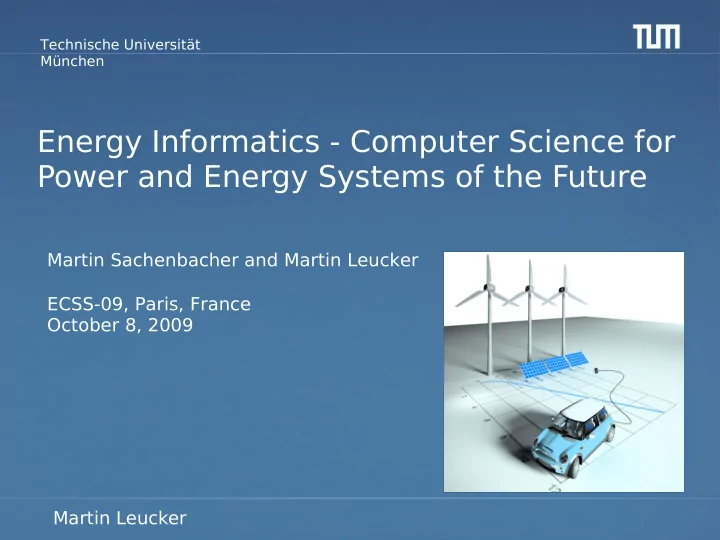

Technische Universität Technische Universität München München Energy Informatics - Computer Science for Power and Energy Systems of the Future Martin Sachenbacher and Martin Leucker ECSS-09, Paris, France October 8, 2009 Martin Leucker
Technische Universität München Energy Informatics? The application and adaption of the large body of achievements in Informatics for addressing the challenges in the Energy Domain. Martin Leucker
Technische Universität München Reducing energy consumption Of buildings - SmartHouses Of computer systems – Green IT Of (Embedded) Systems Martin Leucker
Technische Universität München How to reduce energy consumption? Analyse and Optimize energy consumption of Buildings, Computers, All kind of systems using modeling, analysis, and optimization techniques meanwhile standard in computer science Optimize energy consumption using ICT by Monitoring, Diagnosis, and Planning Again – with techniques from computer science actually deployed in the final system Martin Leucker
Technische Universität München Expansion of Renewable Energy: DESERTEC Martin Leucker
Technische Universität München Expansion of Renewable Energy: Small Producers Farmer transforms into an Energy Farmer managing an Energy Farm Martin Leucker
Technische Universität München Challenge: Renewable Energy Buffering Energy supply becomes increasingly fluctuating/uncertain • due to weather-dependent energy sources (wind and solar power) Goal: shift peak demands by integrating storage devices in grid to store energy in an optimal manner. Martin Leucker
Technische Universität München Challenge: Risk Analysis - T rust? How to model and analyze the reliability of producers? Martin Leucker
Technische Universität München Germany‘s National Electrical Mobility Plan Bring one million electrical vehicles (EVs) to the streets by • 2020 Reduce carbon emissions and dependency on fossil • resources Information & communication technology (ICT) plays major • role Demand-oriented power – production Supply-oriented power – consumption „Prosumers“ buy and – sell energy Martin Leucker Martin Leucker
Technische Universität München E-T our Allgäu Project Show how sustainable electrical transportation using local • and renewable energy can be realized in a rural, touristic region Diverse fleet of 30 EVs, operated and monitored under • typical modes of usage (e.g., commuting to nearby Munich) Funding: 5,8 MEuros, duration: 2009-2011 • Martin Leucker
Technische Universität München Allgäu Model Region Martin Leucker
Technische Universität München Challenge: Cruising Range Prediction and Energetic Route Optimization Limited battery capacity (100-150 km), recharging takes hours • Goal: accurately predict energy consumption for specific route • segments, perform energy-based route optimization Depends on distance and elevation profile, traffic conditions, – weather, battery state, vehicle dynamics, driver behavior, etc. Reason from mixed discrete-continuous and stochastic models – Martin Leucker
Technische Universität München Reasoning with Hybrid Constraint Models (Maier Sachenbacher CPAIOR 2008, PHM 2009) Model discrete-continuous systems with HyPHCA (Hybrid • Probabilistic Hierarchical Constraint Automata) Discretize continuous part using PHAVer (Polyhedral • Hybrid Automaton Verifier) Find solutions using constraint solver (T oulbar2, GeCode, • …) Martin Leucker
Technische Universität München Challenge: Renewable Energy Buffering Goal: shift peak demands by integrating Electric Vehicles • in the power grid to store energy Martin Leucker
Technische Universität München Optimal Energy Buffering under Constraints on Probability of Failure Goal: Maximize storage effectiveness, while minimizing mobility risk • – Given model of physical battery behavior and stochastic model of human car usage (when will the car be driven) – Compute control strategy that maximizes effectiveness of energy buffering, but keeps mobility risk (possibility that user cannot drive car because of insufficient charge) below a certain threshold Promising approach: Iterative risk allocation for model-predictive control with a • joint chance constraint (Ono Williams AAAI 2008) – Finds control strategy that maximizes expected performance in dynamic system with uncertainty, while constraining that probability of failure is below an upper bound (pfail < 0.01) Martin Leucker
Technische Universität München Iterative Risk Allocation (Ono Williams AAAI 2008) Dynamic system x(t+1) = Ax(t) + But with uncertainty • (disturbance, …) Find u1 … ut with probabilistic guarantee pfail < 0.01 (chance • constraint) Iterative algorithm: • compute best control strategy using current risk allocation – decrease/increase risk where constraint is inactive/active – Martin Leucker
Technische Universität München Challenge: Fully automatic markets The Electric Vehicle has to sell and buy energy automatically – on a dynamically changing market place Martin Leucker
Technische Universität München Conclusions Some challenges of the energy domain Reducing energy consumption Energy Production Volatile renewable energy production Large number semi-trustable energy producers Shift towards Electro mobile vehicles ICT can help to address these challenges by using Modeling Analysis, and Optimization Martin Leucker
Recommend
More recommend